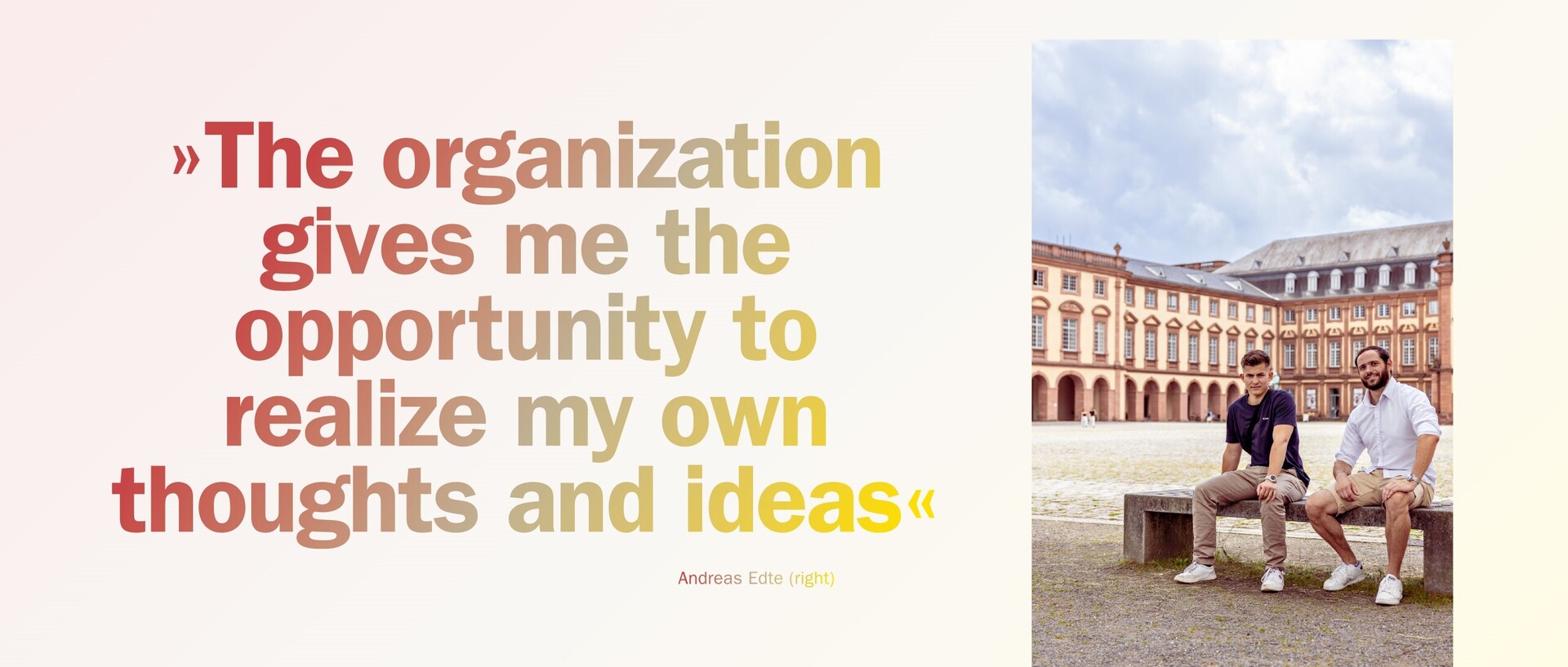When Students Get Organized
Whether it’s education, sustainability, or art and culture: The 45 student organizations at the University of Mannheim are embracing a wide range of issues – and some have been around for decades. AIESEC started out in Mannheim as early as 1951, whereas the Google Developer Student Club was only formed in late 2023. In FORUM, Mannheim students Luis van Ledden and Andreas Edte talk about their involvement in the university’s oldest and youngest student organization.
It’s the world’s largest student organization and, according to the files in the university archive, also the oldest organization at the University of Mannheim: AIESEC. Since the formation of the Mannheim local committee in 1951, its members have worked to promote international exchanges and help young people go on internship or volunteer experiences across the globe.
“In our ‘Global Talent’ program, we place students in internships with businesses abroad. Our ‘Global Volunteer’ program gives youth the opportunity to work in social projects to help support communities in other countries and contribute to their sustainable development.” This is how Luis van Ledden, a business student and Local Committee President of AIESEC Mannheim since February 2024, explains what his organization is offering.
AIESEC Mannheim currently boasts eleven partner cities worldwide that host interested students, including Amsterdam and New Delhi. “But we can also send participants to other AIESEC destinations if we establish a partnership with the city prior to that,” says van Ledden.
Internships or volunteer projects are open not just to university students but to everyone aged between 18 and 30. According to van Ledden, AIESEC supports participants both with finding a suitable position and with organizing their experience and addressing any problems that might arise during their time abroad.
The organization itself currently has 16 members. During the coronavirus pandemic, the work of AIESEC faced heavy restrictions, van Ledden recalls. “That is why our current goal is to make the organization more visible again and recruit new members.” Long-term plans include raising the number of partner cities and creating opportunities right here in Mannheim for interested students from abroad.
Accreditation introduced in 2009
Some student organizations such as AIESEC have been active at the University of Mannheim for decades. But it wasn’t until 2009 that the administration created the option of getting officially accredited as a student organization. To be eligible for accreditation, an organization must be approved as a non-profit association by the Mannheim tax office, and it must have positive evaluations by the President’s Office and a minimum of seven enrolled student members, for example.
Once an organization is accredited, it receives support from the university. This includes the free use of rooms at Parkring 39 and the option to book university rooms for evening events or to advertise the organization on campus with prior approval. Members also receive a certificate confirming their voluntary engagement if they meet certain criteria.
IT-related events
In contrast to AIESEC, the Google Developer Student Club (GDSC) is a newcomer on campus. In November 2023, the founding members of this freshly accredited student organization met for the first time. Among them was Andreas Edte, a master’s student in business informatics and now the organization’s chairman. “The GDSC is very popular in Asia and North America. Not quite so in Europe, that’s why we took the chance and started a club in Mannheim,” he explains.
The organization offers events and workshops related to technology, innovation and careers in this field. “It’s really important to us that participants don’t need any prior knowledge in this field or study a related subject,” Edte points out. “Anyone who simply wants to get a taste of the IT world or learn more about it is very welcome.”
In the past semester, the GDSC already hosted 17 events, including presentations by Google, BASF and SAP experts and a workshop in which participants created their own website. “For the upcoming semester, we are planning a hackathon and a trip to Google’s headquarters in Munich,” says the co-founder.
Although GDSC has only been around for a few months, the club’s membership has “literally exploded,” Edte is happy to report. In June 2024, it already had 173 members, most of them university students. The core team, which is responsible for organizing the events, consists of roughly 25 students. “I think we’ve found a real market niche,” says Edte.
Language training and new contacts
It’s easy to notice the excitement Ledden and Edte feel for their organizations. “In my leadership role, I can grow as a person and expand my team-leading skills,” says the AIESEC President. “It also helps me refine my language skills because we work almost exclusively in English. And last but not least: We get to attend national and international conferences, where we make valuable contacts and meet great people.”
For Edte, who already has some previous volunteering experience under his belt serving as the spokesperson for a student residence hall in Mannheim, building a new organization is an exciting challenge: “It gives me the opportunity to realize my own thoughts and ideas. It’s a new and very interesting learning experience.”
Text: Jessica Scholich / August 2024
The interviews for the articles in this section took place in May and June 2024. It is possible, therefore, that officeholders have changed between the editorial deadline and the time the magazine went to print, or that some information is no longer up to date.
